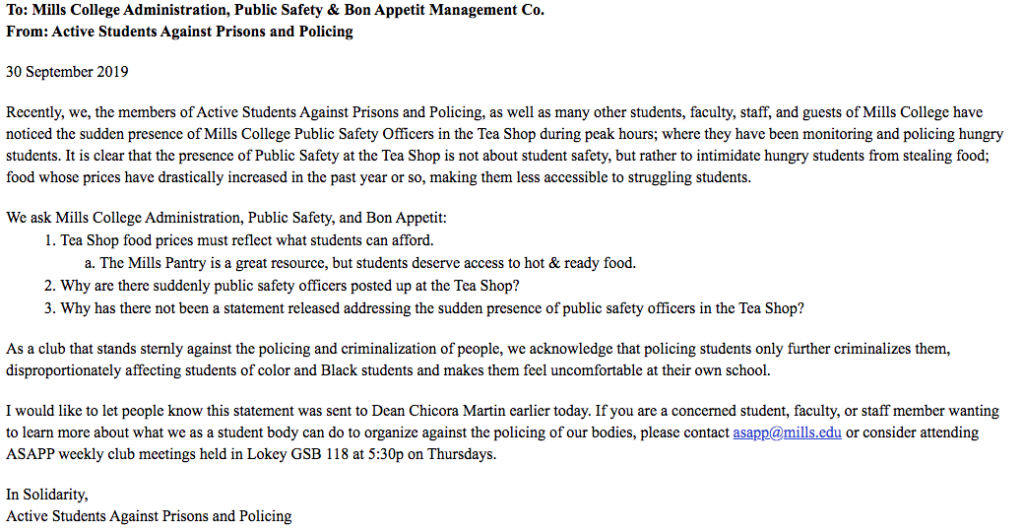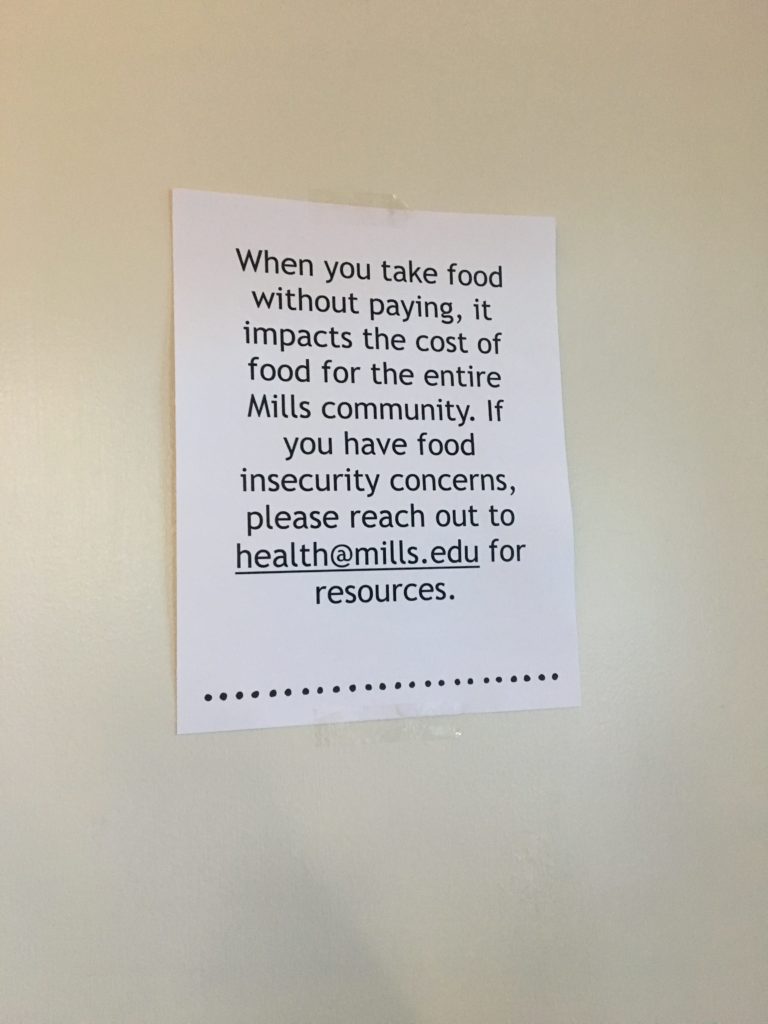When students are hungry at Mills, they have a few options. They have Founders Commons, the main cafeteria on-campus that provides breakfast, lunch and dinner; the Tea Shop, where students can purchase snacks, drinks and hot meals; and the Mills Pantry, where students who are low-income can access shelf-stable foods at no cost. While these options are available, there are still needs that are not being met on-campus and actions being taken to police students’ dining experience.
Many students feel that dining options on-campus are limited and do not meet the needs of everyone. Both Founders Commons and the Tea Shop are catered by Bon Appétit. Founders Commons has limited options for those with dietary restrictions and the Tea Shop prices items are higher than a regular grocery store. For many, going off-campus to buy groceries is not an option.
Toni Gomez, a Mills alumna, wrote her graduate thesis about how food insecurity impacts the Mills Community. She found that over 40% of students were food insecure.
Recently, the cafeteria has placed a sign at its main entrance requesting that those who eat outside on the patio must re-swipe their ID card in order to get more food. Previously, students were able to enter and exit the cafeteria as they pleased with one swipe since the dining is buffet-style. Under this policy, students’ food intake is heavily monitored. This, as well as the new presence of public safety officers at the Tea Shop two weeks ago can be seen as policing students’ food intake.
Students have expressed to The Campanil that they feel intimidation from dining staff when eating in certain spaces. For example, it is typical to be asked not to take food outside of Founders Commons, making students restricted to the limited mealtimes offered. On weekdays, breakfast, lunch and dinner are served in blocks ranging from an hour and a half to two hours, and on weekends students are only served brunch from 10:30 a.m-1 p.m. and dinner from 5-7 p.m. The Tea Shop is closed for the entire weekend, making students who live on-campus reliant on the cafeteria hours and meals.
The feeling of intimidation and policing on-campus prompted students to organize.
On Sept. 30, Yasmeen Garcia, president of the student club Active Students Against Prisons and Policing (ASAPP), released a statement on behalf of the club via the Student forum to address the “policing of Mills students at the Tea Shop.”

The statement acknowledges the monitoring of hungry students during the peak lunch hour and the fact that the Tea Shop prices are not affordable for all students, as access to “hot and ready” food should be easily accessible.
“As a club that stands sternly against the policing and criminalization of people, we acknowledge that policing students only further criminalizes them, disproportionately affecting students of color and Black students and makes them feel uncomfortable at their own school,” the statement reads.
ASAPP directed the statement to Mills College Administration, Public Safety and Bon Appétit, asking questions about the intentions of the officers and lack of statement addressing their presence, which still have yet to be answered.
The following day after the statement was released, Oct. 2, the public safety officers were removed from the Tea Shop and Garcia received a response from Vice President for Strategic Partnerships Renée Jadushlever.
“I don’t think it was an appropriate response to what our concerns were,” Garcia said.
Garcia read from an email Jadushlever sent: “We’re sorry for the impact that the presence of public safety officers in the Tea Shop had on students and our community. Those patrols have been stopped. We hear that this made some uncomfortable and it felt like monitoring and policing was taking place. We are talking with Bon Appétit about providing affordable food options to address those concerns. We encourage students who are food insecure to get in touch with staff, and signage is being placed in the Tea Shop with links to these resources. ”
ASAPP felt the response addressed only part of what ASAPP’s statement inquired about. They were also concerned about the administration’s reasoning for starting the patrols and the lack of a statement to the student body addressing their presence.
“The questions that we proposed to the school and administration; [the administration] didn’t actually answer any of them…they didn’t answer the question as to why [the public safety officers] were there.,” said Alana Mendoza, treasurer of ASAPP.
The signs posted in the Tea Shop stated that the impact of stealing affects the Mills community, causing prices to be raised, and the contact for Health Services for students dealing with food insecurity.

Another sign was placed on a far side door of the Tea Shop, between the grill and vending machine, that warned when used an alarm would sound. Previously, all exits were used by students.
These occurrences, including the monitoring of public safety at Founders, turned ASAPP’s focus to addressing the Mills administration head-on.
In response to a request for comment, Tamara Monosoff, Senior Director of Communications, provided the following statement:
“President Hillman and Dean Martin referred this concern to Renée Jadushlever, Vice President for Strategic Partnerships who supervises Public Safety and our Bon Appétit contract. She responded directly to the Active Students Against Prisons and Policing leadership.”
“She shared with that group the following; ‘Public safety officers will no longer be in the Tea Shop in any official capacity. If they are in the dining spaces it would be as community members purchasing food items. Bon Appétit is working with the College to provide lower-cost items and they will introduce these new menu items soon.'”
ASAPP is a student club created by Garcia, a third-year undergraduate and ethnic studies major. This semester, Garcia reached out to other students who were anti-police and created a board.
The club began with a larger community-based focus beyond campus, specifically on how to better hold community members accountable for their actions and assist those who are incarcerated.
“I think [Garcia] really wanted to be focusing on incarcerated people, specifically incarcerated women,” Mendoza said. “[Garcia] came to me this semester in the beginning…talking about want[ing] to do the zine, sell the zine telling the stories of incarcerated women and then raising money to give to the women whose stories were being told.”
Both Garcia and Mendoza are passionate about the mission of their club and saw an opportunity to give an immediate response to what was happening on-campus.
“Something that could make it better is to hear out students and actually take in what they’re saying.” Garcia said. “And we as students need to find a way to hold [administration] accountable.”
Garcia explained that students feel that Founders Commons does not fulfill all needs and is a struggle for those living in the dorms and are required to have a meal plan. The cost of a meal plan could be countered by buying groceries, but due to a lack of kitchen space, many students are not able to cook their own food. Dorm rules ban microwaves, hot plates and any kind of stove or cooker.
While the Mills Pantry provides basic needs, it only supplies shelf-stable items, while in most cases, students must cook. There is also an issue with the eligibility of other resources such as Calfresh, which does not provide benefits for people who are undocumented; there are undocumented students at Mills.
Students rely heavily on the food options on-campus as many do not have the best accessibility to get off-campus and buy groceries. Living in the dorms, students are often restricted to what is offered in dining areas and therefore their needs are not being fully met.
If students are interested in joining ASAPP, weekly meetings take place in GSB 118 on Thursdays at 5:30 p.m.
Students who need food assistance should contact foodaccess@mills.edu for more resources, and the site foodpantries.org provides a listing of food pantries, soup kitchens and food banks in the area.
